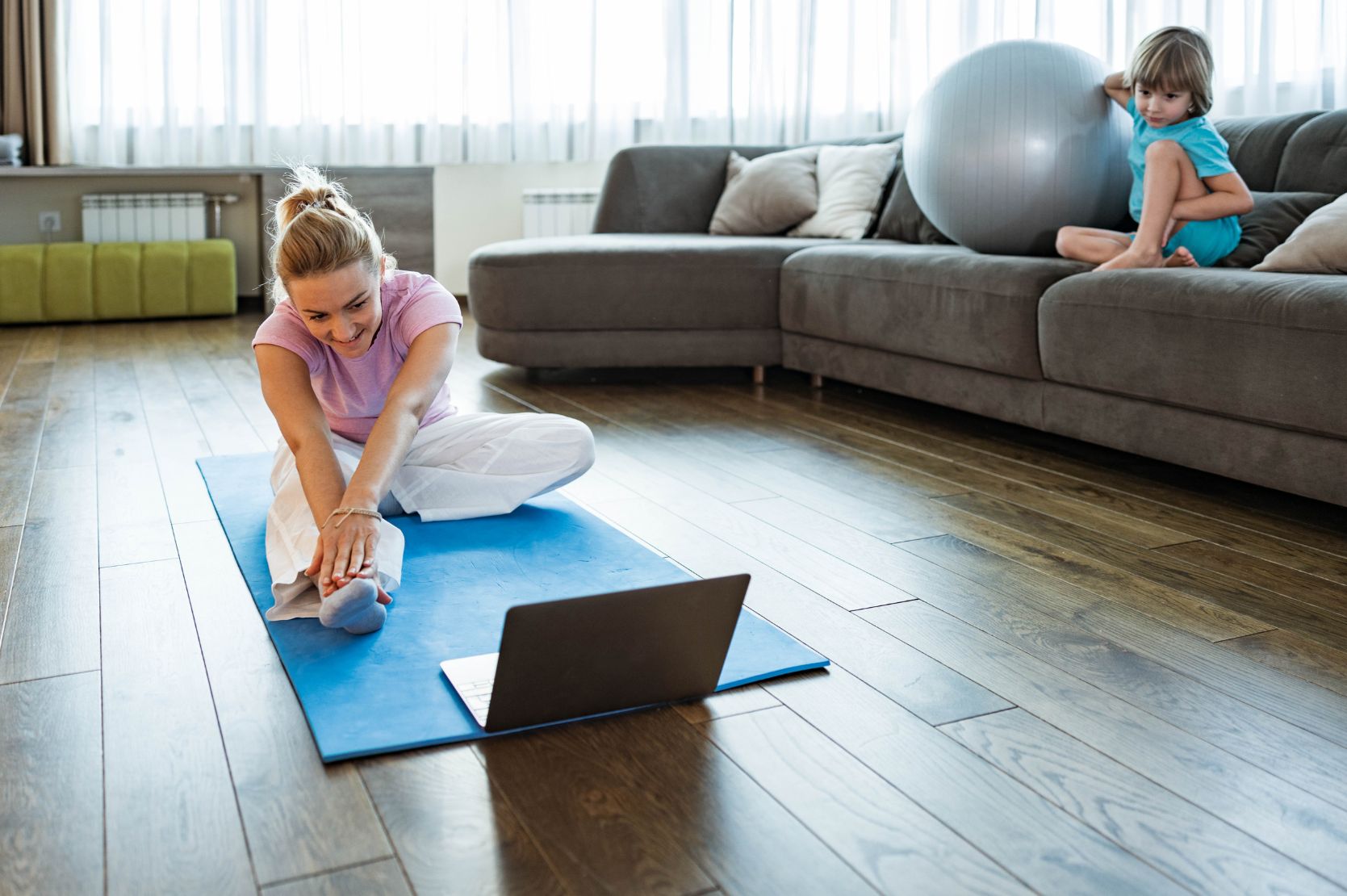
Personal Training for fibromyalgia
The perfect support for well-being
Author: Kerstin Goldstein
Last updated: 4. August 2025
Personal training can be a valuable support for those affected by fibromyalgia. Individual training tailored to the needs of each person can help to alleviate symptoms and make everyday life more manageable.
For people with fibromyalgia, exercise, especially loosening the fascia, is often touted as the key to better managing the pain, constant fatigue and sleep problems.
But what’s the best way to ensure that exercise doesn’t do you more harm than good?
In this blog article you can find out more about the benefits of personal training for fibromyalgia and how you can benefit from it.
How can Personal Training be beneficial for fibromyalgia?
For a few weeks now, I have been training online once a week with Gina, a client who has been dealing with fibromyalgia for many years. Through her own initiative and special coaching, she has managed to feel so well again that she was now ready for regular exercise, albeit at a very low intensity level. Gina particularly wanted to strengthen her abdominal muscles in order to reactivate them after an operation and relieve her constant back pain.
With a Personal Trainer at your side, you, like Gina, have the opportunity to develop a regular training program that is specifically tailored to your needs and your current state of health.
If Gina had trained independently with one of my regular YouTube videos, she might have been physically overstrained many times over at the beginning. But in individual training, I was able to determine the exact intensity that was optimal for her.
Your Personal Trainer can help you find a suitable program that will help you improve your muscle strength and flexibility. You can also learn how to relax properly and create a balance between exertion and recovery. With a good training plan, you will experience an improved body feeling, more energy and a better sense of well-being.
Personal training for fibromyalgia can help you to cope with your everyday life more easily. Unlike YouTube videos or gym classes, it offers you a customized exercise routine that strengthens, loosens or relaxes your muscles and condition:
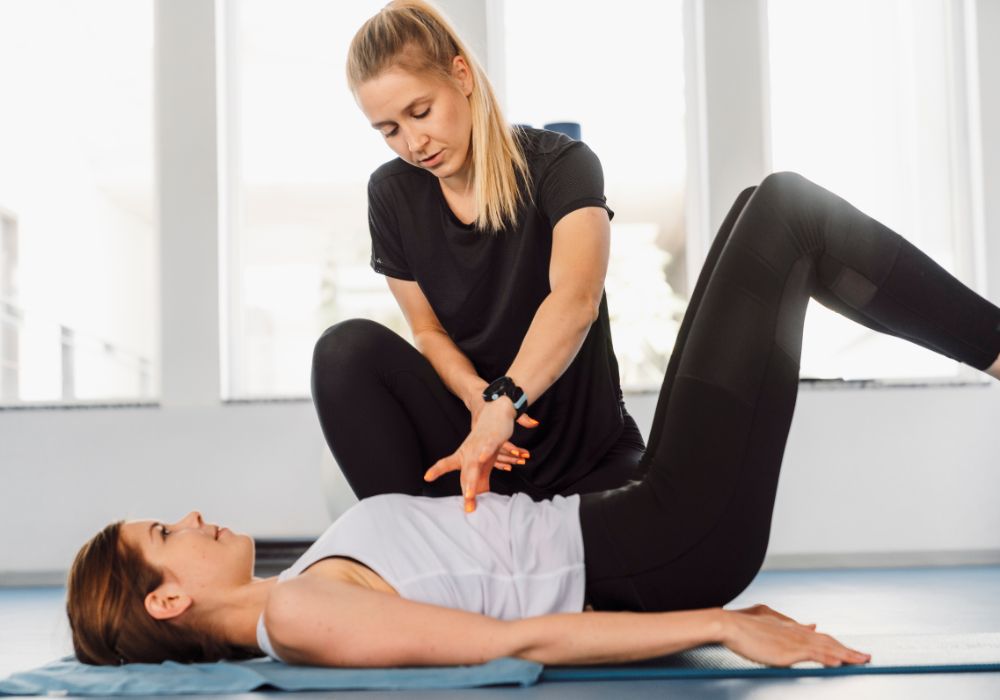
Commitment to yourself
With a condition like fibromyalgia, it’s easy to say, “I’m not doing any sport today, I’m staying on the sofa”. And although this is certainly the right decision on some days, in the long run your muscles atrophy. You become sluggish and everyday activities become more difficult and at some point you don’t even notice them anymore. Your fascia in particular becomes more and more sticky due to too little activity. According to studies, the fascia play a huge part in physical pain.
Numerous books* on the subject of fibromyalgia confirm that exercise, including fascia training, is an important support in becoming pain-free again.
Personal training will make it easier for you to carry out everyday tasks again and find a positive way of dealing with your illness.
Mail from the Wellness Oasis
Receive valuable tips, exercises, and inspiration about fibromyalgia directly in your inbox. Sign up now and stay motivated on your journey to more ease and well-being!
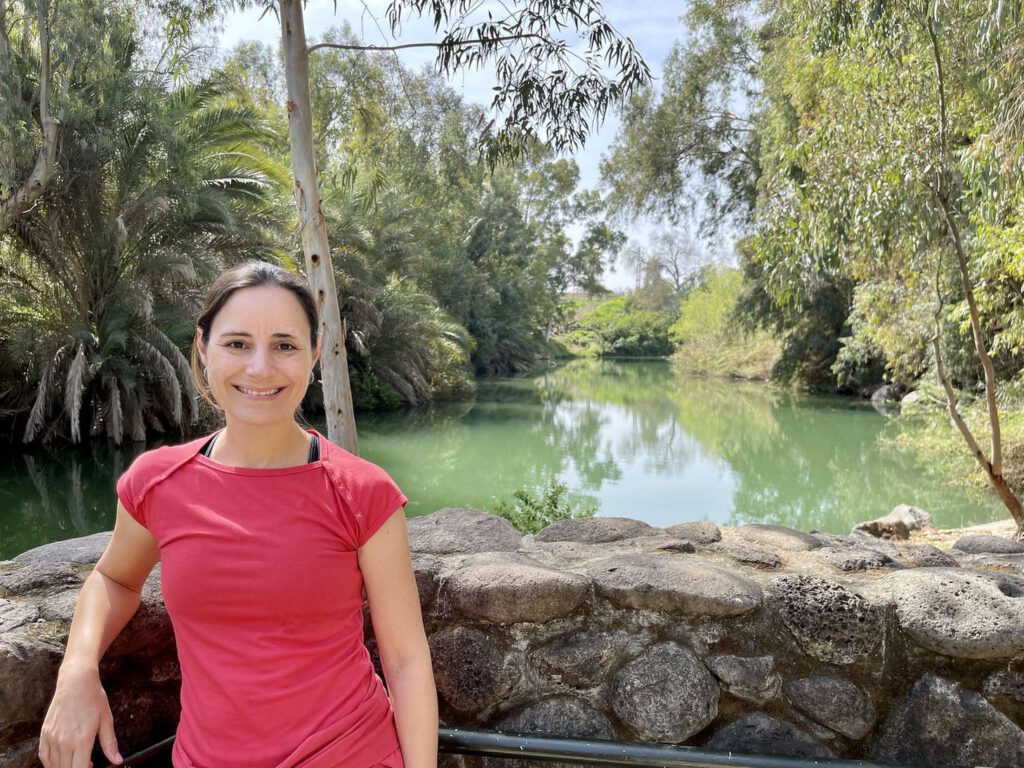
How can professional training help to alleviate discomfort?
Every person with fibromyalgia is different. Therefore, not every exercise and every workout is suitable for every person with the same clinical diagnosis. Some fibro people have more severe physical complaints, others have milder ones. Some have more energy or exercise experience, others less.
In general, however, it should be noted that many people with fibromyalgia:
The majority of fibro people benefit from the following types of training:
Your personal training should therefore place special emphasis on these forms of training. For more tips, take a look at my article on exercise for fibromyalgia.
What are your main movement restrictions that regular training could help you with?
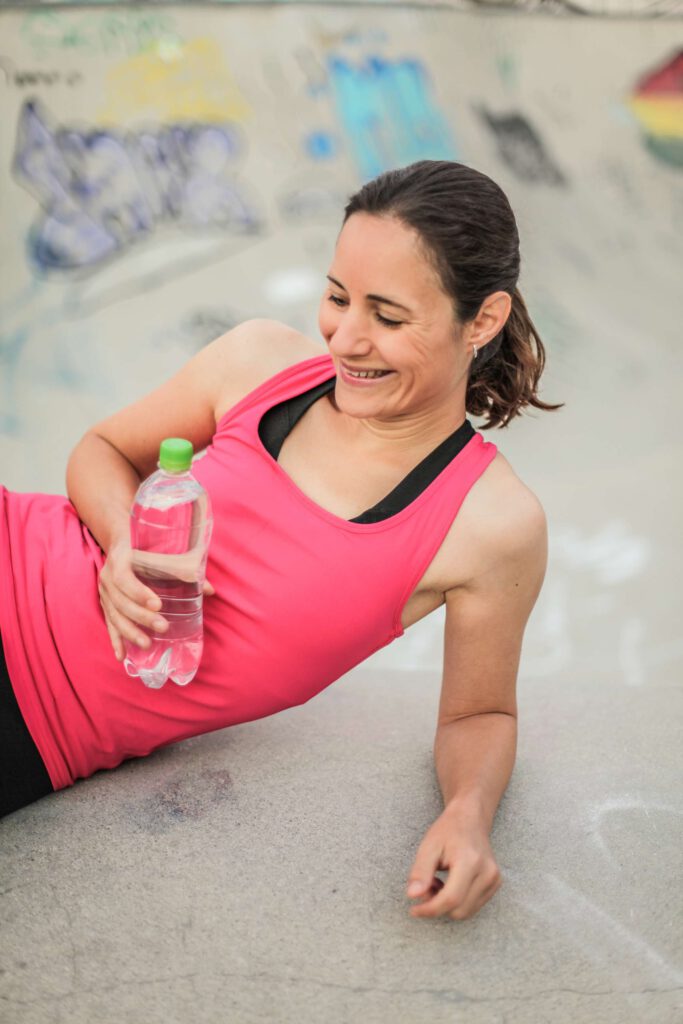
My personal approach to dealing with fibromyalgia
I firmly believe that every person affected by fibromyalgia can find ways to cope better with the disease. It’s not about “curing” in the traditional sense, but about understanding your own body better and developing methods that make everyday life easier.
Through targeted coaching and an exercise program tailored to you, you can learn to regain control of your body and live your life with more energy and joy again.
In my personal exercise “toolkit” I have a variety of different types of activities that I perform depending on how I feel that particular day or what my body could benefit from in that moment.
How can you find and choose a qualified personal trainer?
A good trainer will take the time to understand your goals and expectations and develop a program that is tailored to your needs and your chronic condition, fibromyalgia. Even if they are not affected by fibromyalgia or have little experience in dealing with it.
To ensure you get the perfect combination for your wellbeing, you should make sure you take the right steps when searching for and choosing a personal trainer. It’s important to find a qualified personal trainer who has the necessary knowledge and experience to develop a training program for fibromyalgia.
Look for trainers who have experience in training with chronic illnesses. A trainer with a special rehabilitation sports qualification is more suitable than someone who primarily looks after clients who are young, fit and able to cope with high workout intensity.
Ask for references and read reviews to get a better picture. Even if you find a trainer online, it’s important that you take a close look at the person’s profile to make sure he or she has the necessary experience.
Take a close look at the trainer you want to work with to see if she or he suits you and if you have a good gut feeling.
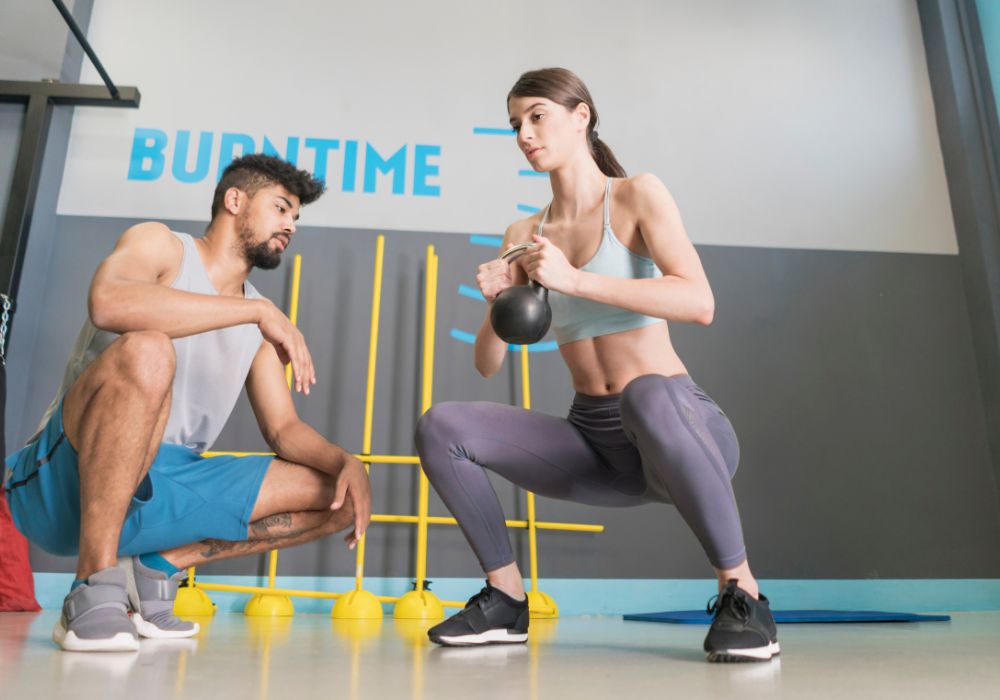
Possible risks of personal training for fibromyalgia?
Imagine you go to your local gym and ask for a personal trainer. The person you are supposed to train with has never heard of fibromyalgia. Your fitness coach is well certified, has a lot of experience, has been working at the gym for several years and is very popular with the members. You think that’s enough to train with YOU.
STOP!
Your body is already in pain and reacts sensitively to unaccustomed strain.
You are often exhausted and tired.
You may not have exercised regularly for a long time.
You hurt in one body part today and another tomorrow and every day you feel different.
If you work with a trainer who has little or no knowledge of fibromyalgia and your particular physical sensitivities, then you might not benefit from your training. Quite the opposite. It is very likely that your trainer will overwhelm you without meaning to. Exercises that are suitable for other beginners may not be suitable for your needs.
So pay close attention to who you choose to work with. Because the wrong trainer, no matter how well certified they may be, will do you more harm than good.
=> This is exactly what happened to me as a customer recently. After moving back to Germany, I joined a gym again after years of abstinence.
At the first trainer appointment, which I also attend because every studio has different equipment, I told the trainer about my fibromyalgia. She nodded and I asked her not to create a training plan for me (because I claim to know myself better than anyone else ;), and instead just to show me in general how to set up the individual machines correctly.
Nevertheless, the trainer kept mentioning that I should do 3 sets of 12 repetitions per machine (which is standard advice in gyms). If I followed this advice, even I would have unwanted flare-ups and wouldn't be able to get off the sofa for the next 3 weeks.
=> In general, training on strength machines is not the best choice for people with fibromyalgia. I haven't touched any gym equipment for 5 years either, preferring to pamper my body with YinYoga, Pilates, stretching or fascia training. Now (as of summer 2024), however, I feel ready to give equipment training a try again.
Think in advance about what is important to you in a personal trainer. What characteristics should this person cover for you?
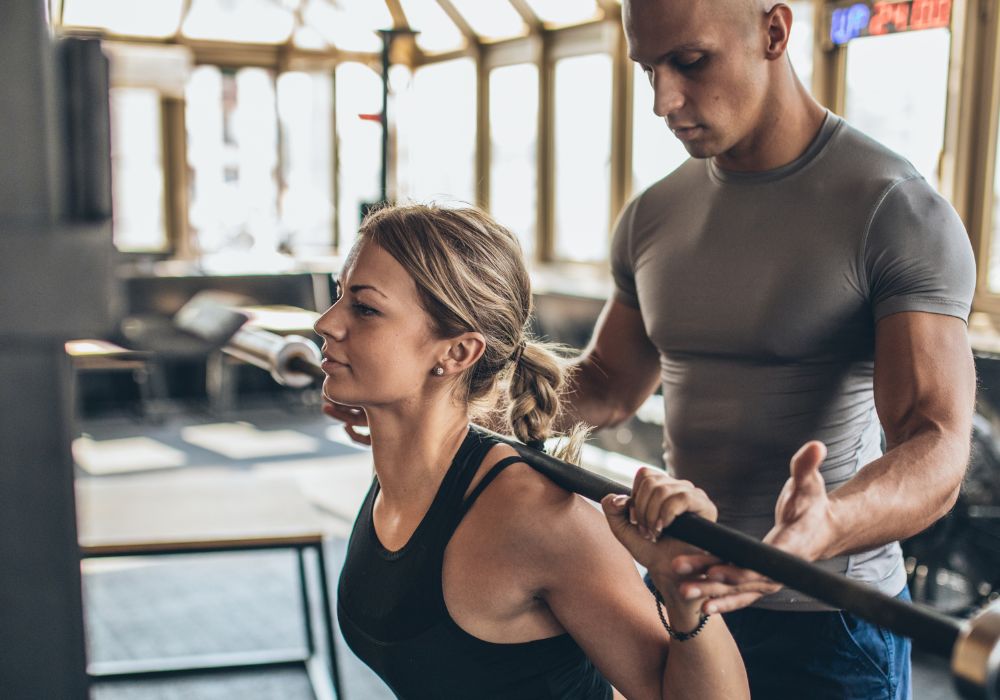
Training duration and intensity for maximum benefit
To reap the benefits of personal training, it is important to adapt the duration and intensity of the training to your individual needs and capabilities. For people with fibromyalgia and similar chronic conditions, it is particularly important that they find a workout that helps them to reduce their symptoms and discomfort.
My fibro-friendly Personal Training sessions, for example, are always 30 minutes. That’s the time we spend together. But that doesn’t mean that we necessarily do 30 minutes of sport. With my client Gina, for example, I “exercise” for about 15-20 minutes. We spend the rest of the time doing breathing exercises or checking in on how she has been doing in terms of exercise, everyday activities and her life in general with fibromyalgia over the past week.
The first question at the start of every personal training session I have for a client: “What do you need today to feel better after our session?”
And their answer to this question can vary from appointment to appointment. Sometimes they have a little more energy and want to strengthen their abdominal muscles. The next training session they might feel tired and a relaxing fascia release session is more suitable.
If you don’t have any energy at all on a training session, we loosen up a little and then practice your breathing or bring your stress levels down with a few YinYoga exercises or a nice meditation.
There’s always something we can work on. For me, it’s not just about exercising, but about making you feel better and more comfortable after our meeting. That’s why I adapt each session spontaneously to your current needs.
During my personal training sessions, I never hold a clipboard to tick off the exercises you’ve done today. Every training session with me is different, just like you come to every training session with a different energy.
When is the right time to start personal training for fibromyalgia?
The “right time” to get started doesn’t exist. I know this from over 25 years of working with people who want to do something for their bodies and their health for a variety of reasons.
There’s always something to stop you from starting your personal training. The kids are sick – the job is particularly stressful – the parents need looking after – you have too much laundry to do. Whatever …
The only important prerequisite is that you FEEL READY for exercise. You should therefore be medically well adjusted so that your fibro medication is at least effective enough for you to make your way to your exercise mat or kitchen chair for seated training. We will then adapt the exercises we actually do to your condition on the day.
You should also talk to your doctor in advance about exercise recommendations, especially if you have non-fibro-related physical limitations, such as disc or joint problems.
Tell your doctor/physio that you are planning to be more active with the help of personal training and ask for recommendations. I will be happy to incorporate these into our training.
5 tips on how to make the most of your personal training sessions
Conclusion: PT can be valuable
Personal Training for fibromyalgia is an excellent way to improve your wellbeing. A personal trainer can help you improve your physical and mental health by adapting to your individual needs and offering you a workout that is tailored to your abilities and current fitness level.
A personal trainer can also help you to structure your other activities. In addition, personal training gives you a level of motivation and support that you may not get from other training methods.
👉 Would you like to get to know me better and find out whether we are a good match for Personal Training? Just book a date via my calendar.